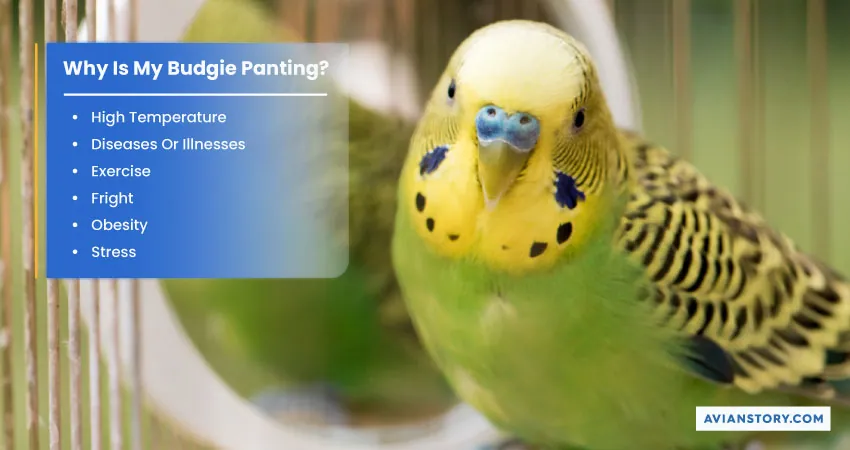Why Is My Budgie Panting? [6 Possible Causes]
Budgies are a common pet to have if you want a bird, as they’re adorable and don’t take much effort to keep. However, some of their behaviors can be quite unusual or concerning, and an example of this is panting too much.
So you might be wondering, why is my budgie panting? The most common causes are high temperatures, obesity, sicknesses, or being scared. Sometimes it’s due to excitement too, but it’s quite rare.
There’s more to it than just that. Today, we’ll be covering all about why your budgie might be panting too much, how to comfort them when this happens, how to stop it from happening later on, and more. Let’s begin.
6 Reasons Why Your Budgie Might Be Panting
Budgies can be seen panting for several reasons, but before we get into that, there’s a reason that most people forget about. When your budgie is carrying fertilized eggs, it’s common for them to heavily breathe or pant.

This is very common, but most people forget about it. Other than that, here’s a detailed explanation of the reasons why your budgie might be panting.
1. High Temperature
Budgies are considered tropical birds, but they can’t withstand intense heat. If the heat outside is greater than375 degrees Fahrenheit, they’ll likely pant to cool their bodies down. So you should generally avoid any temperature over regular room temperature with your budgie.
2. Diseases Or Illnesses
Although it isn’t always common, sometimes your budgie might be panting from illnesses, especially infections. There should be other signs if it’s due to illness. In that case, you should immediately take your budgie to a vet.
Sometimes your budgie might have infections in their respiratory tract too, which can be caused by dust and other particles in the environment.
3. Exercise
Just like humans, budgies can pant after exercising or keeping their body active in some way for a long time. So after that, budgies will pant to get their body to a cool enough state again.
Generally, you should make sure to have a well-ventilated room while they’re exercising and provide them with fresh room temperature water. Make sure it’s not too cold but not too hot, either.
4. Fright
When you just recently got your budgie, it can be scared of the environment and might be panting. If this is the case, you should slowly approach your budgie and try to get them comfortable. Patting their head lightly and giving them treats is a good way to start.
5. Obesity
When your budgie is overweight or obese, they might pant often. This is the same case for humans, budgies, and other animals. They may even suffer from many respiratory issues depending on how obese they are. Other illnesses might also contribute to it.
Here’s a table of the recommended weight for most budgie ages.
| Age | Recommended Weight Range |
| 1-2 Days (Newborn) | 1 to 2 grams |
| 7 days | 8 to 15 grams |
| 10 days | 18 to 25 grams |
| 14 days | 28 to 36 grams |
| 30 days | 43 to 50 grams |
Anything over these weights is overweight, but if your budgie is underweight, that’s not good either. Get them checked by the vet for any abnormalities in their weight.
6. Stress
Stress is one of the most common reasons your budgie might be panting. This can be caused due to a lack of social interaction, a cage not big enough, and loud noises. This can greatly affect their mental health, too, so make sure to take care of your budgie properly.
Why Is My Budgie Breathing Heavily?
You may already have some insights into the question, ‘Why is my budgie panting so much?’ Building on that understanding, we will explore another behavior that’s closely associated with panting in budgies – heavy breathing. Just like panting, heavy breathing in these small birds is a sign that warrants attention and concern.
![Why Is My Budgie Panting? [6 Possible Causes] 1](https://avianstory.com/wp-content/uploads/2022/10/Why-Is-My-Budgie-Breathing-Heavily.webp)
Most of the time, they’ll be breathing heavily due to the following reasons.
- High Temperatures.
- Stress.
- Being scared.
- Overheating.
- Sickness.
- Dust.
- Smoke.
They’re pretty similar to why your budgie may be panting. So take the necessary steps based on their condition to help them breathe normally.
How to Comfort a Panting Budgie
If your budgie is panting, you should try to comfort them first. Every budgie can get comforted in different ways depending on their personalities, so it might be different for you than others.
![Why Is My Budgie Panting? [6 Possible Causes] 2](https://avianstory.com/wp-content/uploads/2022/10/How-to-Comfort-a-Panting-Budgie.webp)
But as a general structure, you should follow these steps to comfort a panting budgie.
1. Cool The Room
Budgies generally feel a lot calmer in cooler environments. So if your budgie is panting, you should move their cage to a cooler and quiet environment.
Make sure to move them slowly so they don’t feel pressured or scared.
2. Speak Quietly
Budgies despise loud noises, which includes their owner’s voice too. Make sure to speak to your budgies in a relatively quiet voice so that they don’t get scared. It can help them get calm too.
3. Give Your Budgie Time
A lot of people think that to calm your budgie, you always have to stay near them and interact with them, but a lot of the time, you just have to leave them alone in their cage. This can help them calm down by themselves.
Don’t do this always, though. Make sure to try and comfort them first and then let them have some quiet time in their cage, often with toys like a swing or a mirror to keep them entertained.
4. Bathe Your Budgie
If your budgie is panting or breathing heavily, you should consider bathing them. This can help reduce their body temperature and get them calm. Make sure the water isn’t too cold, though, as budgies prefer lukewarm water. Sometimes warm water is good too, depending on their preference.
How to Stop My Budgie from Panting
Budgies usually pant due to reasons such as stress and heat rather than medical difficulties. So if your budgie doesn’t have any diseases or illnesses, you won’t need to worry about stopping them from panting, and you should simply comfort them and treat them instead.
![Why Is My Budgie Panting? [6 Possible Causes] 3](https://avianstory.com/wp-content/uploads/2022/10/How-to-Stop-My-Budgie-from-Panting.webp)
Simply removing the reasons that cause panting, such as stress, loud noises, high temperature, fright, and exercise, is good enough. Make sure to give them enough water, keep them in a place that isn’t too hot, and get them comfortable with their surroundings. They’ll usually stop panting this way.
Budgies that pant frequently have reasons to get their owners panicked. Some folks go crazy asking, “Why is my budgie always panting? ”
If that’s too frequent, it’s most likely due to a medical issue, such as an infection or a respiratory issue. In that case, you should immediately take them to the vet as illnesses can cost their life in some cases.
Frequently Asked Questions (FAQs)
Now that you have a good idea of why budgies can be panting, you should take a look at our most frequently asked questions. These can help clear any further confusion.
Can my budgie die due to excessive heat?
Yes, budgies can die from a heat stroke if the temperature is too high. This usually happens at around 90 to 100 degrees Fahrenheit or more, and the chances of getting a heat stroke are higher if your budgie is sitting still.
High temperatures are rather common in summer, so you can check this article out by ZooPlus to know more about taking care of your budgie during summer.
Should I spray my budgies with water if it’s panting due to excessive heat?
Yes! Spraying your budgie with water is a good practice, especially during high temperatures in summer. They’ll enjoy the small drops of water on their body, and it’ll help calm them down.
Conclusion
understanding the various reasons behind your budgie’s panting is crucial for their health and well-being. From environmental factors like temperature and stress to more serious concerns such as respiratory infections, each cause requires specific attention and care.
While many of these issues can be managed with changes in their habitat, diet, and routine, it’s vital to remain vigilant and seek veterinary assistance when necessary, especially in cases of respiratory distress.
Remember, your proactive approach and informed care can make a significant difference in the life of your feathered companion, ensuring they remain happy, healthy, and vibrant members of your family.
